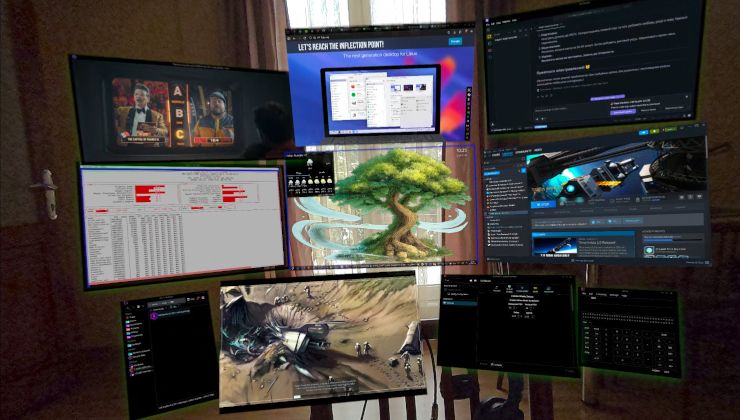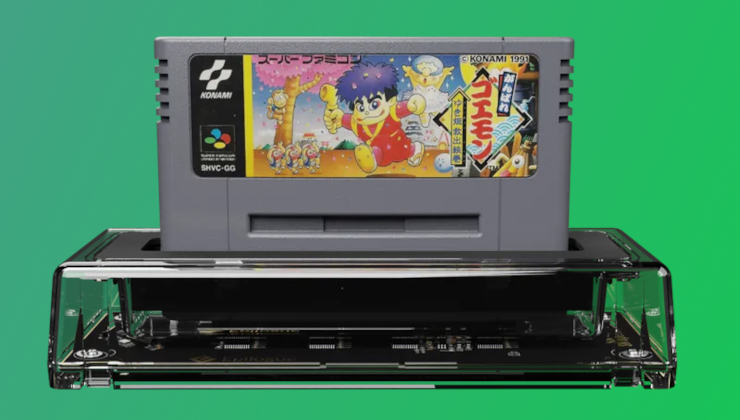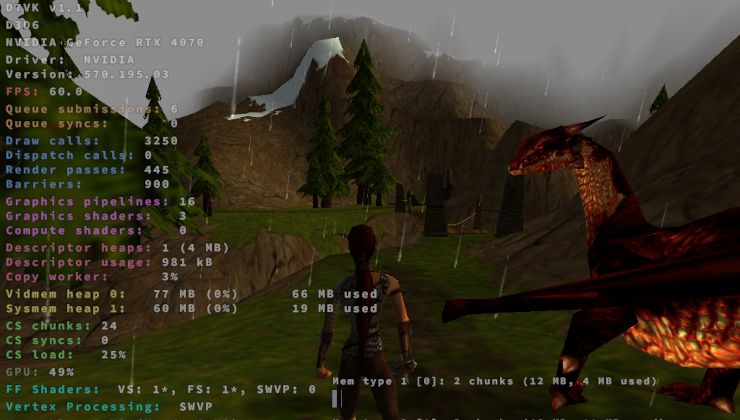A few months after the last release, Mesa 19.2 is officially available today pushing open source GPU drivers to new heights.
Since this is a major release, as the developers note you might want to wait for the first point release (19.2.1) to clear up any nuisance issues as it sees more testing.
As an NVIDIA owner and user, I don't tend to follow Mesa development and their release notes aren't exactly an easy read unless you really know your graphics API features. You know the drill with driver releases: you should hopefully see better performance, support for newer hardware and so on. Anyway, these are the highlights they noted:
- GL_ARB_post_depth_coverage on radeonsi (Navi)
- GL_ARB_seamless_cubemap_per_texture on etnaviv (if GPU supports SEAMLESS_CUBE_MAP)
- GL_EXT_shader_image_load_store on radeonsi (with LLVM >= 10)
- GL_EXT_shader_samples_identical on iris and radeonsi (if using NIR)
- GL_EXT_texture_shadow_lod on i965, iris
- EGL_EXT_platform_device
- VK_AMD_buffer_marker on radv
- VK_EXT_index_type_uint8 on radv
- VK_EXT_post_depth_coverage on radv
- VK_EXT_queue_family_foreign on radv
- VK_EXT_sample_locations on radv
- VK_EXT_shader_demote_to_helper_invocation on Intel.
- VK_KHR_depth_stencil_resolve on radv
- VK_KHR_imageless_framebuffer on radv
- VK_KHR_shader_atomic_int64 on radv
- VK_KHR_uniform_buffer_standard_layout on radv
Around 25 bugs were solved with this release as well including issues with KWin, Overwatch, Tropico 6, Geekbench 5, Supraland, The Surge, Shadow Tactics: Blades of the Shogun and more.
Our friends over at Phoronix have a few interesting links of features added in Mesa 19.2 which you can find here.
You can find the official release notes here.
Quoting: linuxcityI have the Mesa aco drivers should I stick with that or go with this oneIf you want to use valve compiler for AMD GPU you should stick with your current drivers or use a bleeding-edge version of Mesa (aco was merged and will be shipping with Mesa 19.3).
From my point of view, your best option is to keep at system wide a stable version of Mesa and compile ACO drivers by yourself. That way you will have a stable system and you will also be able to use ACO on the games/app you prefer.
EDIT: worth mention that compiling may not be mandatory if you have an Ubuntu based distro. In that case you can unpack deb files of a Mesa-ACO ppa in specific directories in order to get the driver running (the same should be possible with arch based distros).
Last edited by x_wing on 25 Sep 2019 at 8:29 pm UTC
Quoting: linuxcityI have the Mesa aco drivers should I stick with that or go with this oneYou should stick with the ACO repository. Not everything that ACO needs was merged yet.
Namely some NIR bits.
Quoting: x_wingYou lost me at "compile". I kept at it, but then there was something about unpack deb files. Jesus, it's 2019. This isn't 2012 Linux anymore. Either it'll work by adding a package/snap, or at worst, I have to add a PPA. Compiling? C'mon.Quoting: linuxcityI have the Mesa aco drivers should I stick with that or go with this oneIf you want to use valve compiler for AMD GPU you should stick with your current drivers or use a bleeding-edge version of Mesa (aco was merged and will be shipping with Mesa 19.3).
From my point of view, your best option is to keep at system wide a stable version of Mesa and compile ACO drivers by yourself. That way you will have a stable system and you will also be able to use ACO on the games/app you prefer.
EDIT: worth mention that compiling may not be mandatory if you have an Ubuntu based distro. In that case you can unpack deb files of a Mesa-ACO ppa in specific directories in order to get the driver running (the same should be possible with arch based distros).
In all seriousness, I didn't understand pretty much any of your answer. And while I realise that ignorance is nothing to be proud of, if this is what we need to learn to play games on Linux, we've already lost this fight, I think. No idea what "KDE Neon" architecture is, but it sounds like Gentoo, Slackware, or Arch - totally hardcore. Not my scene (obviously).
Quoting: linuxcityI have the Mesa aco drivers should I stick with that or go with this onePersonally I would stick with what you have, if you are using valves repo/ppa, you get access to the updates before they're upstreamed and from my personal experience it's working very well already. It's easy enough to disable aco in favour of llvm on a per game basis with
RADV_PERFTEST=llvm if you do encounter any problems.When the project has matured more and is enabled by default in mesa, then I will probably switch back to mesa stable or mesa-git.
Quoting: scaineI understand that it can sound complex and difficult (still, believe it or not compiling mesa only requires to run three commands... after you resolve a ton of dependencies :P) but it is only related to being able to use an experimental driver with the flexibility I suggested.Quoting: x_wingYou lost me at "compile". I kept at it, but then there was something about unpack deb files. Jesus, it's 2019. This isn't 2012 Linux anymore. Either it'll work by adding a package/snap, or at worst, I have to add a PPA. Compiling? C'mon.Quoting: linuxcityI have the Mesa aco drivers should I stick with that or go with this oneIf you want to use valve compiler for AMD GPU you should stick with your current drivers or use a bleeding-edge version of Mesa (aco was merged and will be shipping with Mesa 19.3).
From my point of view, your best option is to keep at system wide a stable version of Mesa and compile ACO drivers by yourself. That way you will have a stable system and you will also be able to use ACO on the games/app you prefer.
EDIT: worth mention that compiling may not be mandatory if you have an Ubuntu based distro. In that case you can unpack deb files of a Mesa-ACO ppa in specific directories in order to get the driver running (the same should be possible with arch based distros).
In all seriousness, I didn't understand pretty much any of your answer. And while I realise that ignorance is nothing to be proud of, if this is what we need to learn to play games on Linux, we've already lost this fight, I think. No idea what "KDE Neon" architecture is, but it sounds like Gentoo, Slackware, or Arch - totally hardcore. Not my scene (obviously).
To be fair, the easiest and simple way to test mesa-aco is to keep it installed system wide and that requires as much knowledge as installing a beta driver on Windows (if not less). So the learning curve for playing games on Linux is not different to Windows even if you want to play around with experimental features.
BTW, KDE Neon is a Ubuntu based distro. No black magic involved and it's a nice distro if you like to get KDE latest releases.
Last edited by x_wing on 26 Sep 2019 at 3:05 am UTC
Quoting: scaineOh, please. If you want the latest, bleeding-edge, experimental stuff (like ACO), then you are obviously going to dirty your hands. The ecosystem around them isn't mature, the projects cannot necessarily be considered "stable", and are not included by default in most "simple" environments :)Quoting: x_wingYou lost me at "compile". I kept at it, but then there was something about unpack deb files. Jesus, it's 2019. This isn't 2012 Linux anymore. Either it'll work by adding a package/snap, or at worst, I have to add a PPA. Compiling? C'mon.Quoting: linuxcityI have the Mesa aco drivers should I stick with that or go with this oneIf you want to use valve compiler for AMD GPU you should stick with your current drivers or use a bleeding-edge version of Mesa (aco was merged and will be shipping with Mesa 19.3).
From my point of view, your best option is to keep at system wide a stable version of Mesa and compile ACO drivers by yourself. That way you will have a stable system and you will also be able to use ACO on the games/app you prefer.
EDIT: worth mention that compiling may not be mandatory if you have an Ubuntu based distro. In that case you can unpack deb files of a Mesa-ACO ppa in specific directories in order to get the driver running (the same should be possible with arch based distros).
In all seriousness, I didn't understand pretty much any of your answer. And while I realise that ignorance is nothing to be proud of, if this is what we need to learn to play games on Linux, we've already lost this fight, I think. No idea what "KDE Neon" architecture is, but it sounds like Gentoo, Slackware, or Arch - totally hardcore. Not my scene (obviously).
I mean, this is like trying to perform some extreme overclocking, and complaining that you have to learn stuff on CPU and memory architecture. Or buying a custom set of "performance" parts for your car, and complaining about having to bolt them on yourself.
It isn't that hard to do or learn, but are you sure that's really what you want, if you are not prepared to spend some time learning?
Personally, even though I could do it, and have done so occasionally, I prefer to stay with the defaults, and spend my energy elsewhere ;)
Last edited by MayeulC on 26 Sep 2019 at 12:27 pm UTC
Quoting: MayeulCYep, x_wing already answered to this effect. The fact that this is all very experimental/cutting-edge was lost on me when I typed my comment. Like you, I prefer to just "play games" these days. My interest in that level of tinkering pretty much dried up when Steam launched on Linux and the whole experience became that much more mainstream.Quoting: scaineOh, please. If you want the latest, bleeding-edge, experimental stuff (like ACO), then you are obviously going to dirty your hands. The ecosystem around them isn't mature, the projects cannot necessarily be considered "stable", and are not included by default in most "simple" environments :)Quoting: x_wingYou lost me at "compile". I kept at it, but then there was something about unpack deb files. Jesus, it's 2019. This isn't 2012 Linux anymore. Either it'll work by adding a package/snap, or at worst, I have to add a PPA. Compiling? C'mon.Quoting: linuxcityI have the Mesa aco drivers should I stick with that or go with this oneIf you want to use valve compiler for AMD GPU you should stick with your current drivers or use a bleeding-edge version of Mesa (aco was merged and will be shipping with Mesa 19.3).
From my point of view, your best option is to keep at system wide a stable version of Mesa and compile ACO drivers by yourself. That way you will have a stable system and you will also be able to use ACO on the games/app you prefer.
EDIT: worth mention that compiling may not be mandatory if you have an Ubuntu based distro. In that case you can unpack deb files of a Mesa-ACO ppa in specific directories in order to get the driver running (the same should be possible with arch based distros).
In all seriousness, I didn't understand pretty much any of your answer. And while I realise that ignorance is nothing to be proud of, if this is what we need to learn to play games on Linux, we've already lost this fight, I think. No idea what "KDE Neon" architecture is, but it sounds like Gentoo, Slackware, or Arch - totally hardcore. Not my scene (obviously).
I mean, this is like trying to perform some extremem overclocking, and complaining that you have to learn stuff on CPU and memory architecture. Or buying a custom set of "performance" parts for your car, and complaining about having to bolt them on yourself.
It isn't that hard to do or learn, but are you sure that's reeally what you want, if you are not prepared to spend some time learning?
Personally, even though I could do it, and have done so occasionaly, I prefer to stay with the defaults, and spend my energy elsewhere ;)
I use manjaro so I mostly dont bother, the community tests everything before it goes on the stabel version of manjaro. And I havent got any hickups before, still the more you know :).
Quoting: scaineMy apologies, I didn't mean to lecture you on this. I was still asleep when I wrote this, and it wasn't clear to me that x_wing had already pointed out this was an experimental project :PQuoting: MayeulCYep, x_wing already answered to this effect. The fact that this is all very experimental/cutting-edge was lost on me when I typed my comment. Like you, I prefer to just "play games" these days. My interest in that level of tinkering pretty much dried up when Steam launched on Linux and the whole experience became that much more mainstream.Quoting: scaineOh, please. If you want the latest, bleeding-edge, experimental stuff (like ACO), then you are obviously going to dirty your hands. The ecosystem around them isn't mature, the projects cannot necessarily be considered "stable", and are not included by default in most "simple" environments :)Quoting: x_wingYou lost me at "compile". I kept at it, but then there was something about unpack deb files. Jesus, it's 2019. This isn't 2012 Linux anymore. Either it'll work by adding a package/snap, or at worst, I have to add a PPA. Compiling? C'mon.Quoting: linuxcityI have the Mesa aco drivers should I stick with that or go with this oneIf you want to use valve compiler for AMD GPU you should stick with your current drivers or use a bleeding-edge version of Mesa (aco was merged and will be shipping with Mesa 19.3).
From my point of view, your best option is to keep at system wide a stable version of Mesa and compile ACO drivers by yourself. That way you will have a stable system and you will also be able to use ACO on the games/app you prefer.
EDIT: worth mention that compiling may not be mandatory if you have an Ubuntu based distro. In that case you can unpack deb files of a Mesa-ACO ppa in specific directories in order to get the driver running (the same should be possible with arch based distros).
In all seriousness, I didn't understand pretty much any of your answer. And while I realise that ignorance is nothing to be proud of, if this is what we need to learn to play games on Linux, we've already lost this fight, I think. No idea what "KDE Neon" architecture is, but it sounds like Gentoo, Slackware, or Arch - totally hardcore. Not my scene (obviously).
I mean, this is like trying to perform some extremem overclocking, and complaining that you have to learn stuff on CPU and memory architecture. Or buying a custom set of "performance" parts for your car, and complaining about having to bolt them on yourself.
It isn't that hard to do or learn, but are you sure that's reeally what you want, if you are not prepared to spend some time learning?
Personally, even though I could do it, and have done so occasionaly, I prefer to stay with the defaults, and spend my energy elsewhere ;)
Hopefully, this work will end up profiting every mesa driver. I can see some shader being initially compiled with ACO, then being asynchronously replaced by a more performance-optimized version a bit later, if needs be :)
But yeah, these days, I try not to bother with all of this; that's why I bought a Ryzen "X" series: the promises of automatic overclocking won me over :D
Quoting: ZeloxCool, better performace is always better ^^. Only thing i never got or understood, some here seems to still want to stick with an older mesa. Any reason for this? And how do one still stick with an older version?Well, I guess they are using their distro packages. And it's often distro policy (Debian, Slackware) to follow "if it ain't broken, don't fix it": no major upgrades between distribution releases, because you risk breaking stuff that's already working. That's stability at all cost, which is great for some uses. Your stuff won't necessarily work better with updates, but at least it won't be worse.
I use manjaro so I mostly dont bother, the community tests everything before it goes on the stabel version of manjaro. And I havent got any hickups before, still the more you know :).
Last edited by MayeulC on 26 Sep 2019 at 12:38 pm UTC
Quoting: MayeulCWell, I guess they are using their distro packages. And it's often distro policy (Debian, Slackware) to follow "if it ain't broken, don't fix it": no major upgrades between distribution releases, because you risk breaking stuff that's already working. That's stability at all cost, which is great for some uses. Your stuff won't necessarily work better with updates, but at least it won't be worse.Its arch based and somewhat "cutting edge". Only difference from arch seems to be, they test it a bit harder before it gets out to the stable version of manjaro. So Im sure they will put out the new mesa version if its doing fine in testing :).










 How to setup OpenMW for modern Morrowind on Linux / SteamOS and Steam Deck
How to setup OpenMW for modern Morrowind on Linux / SteamOS and Steam Deck How to install Hollow Knight: Silksong mods on Linux, SteamOS and Steam Deck
How to install Hollow Knight: Silksong mods on Linux, SteamOS and Steam Deck